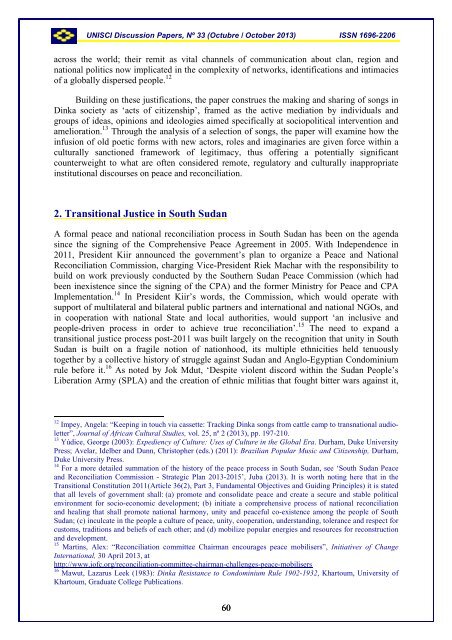UNISCI - Universidad Complutense de Madrid
UNISCI - Universidad Complutense de Madrid
UNISCI - Universidad Complutense de Madrid
Create successful ePaper yourself
Turn your PDF publications into a flip-book with our unique Google optimized e-Paper software.
<strong>UNISCI</strong> Discussion Papers, Nº 33 (Octubre / October 2013) ISSN 1696-2206across the world; their remit as vital channels of communication about clan, region andnational politics now implicated in the complexity of networks, i<strong>de</strong>ntifications and intimaciesof a globally dispersed people. 12Building on these justifications, the paper construes the making and sharing of songs inDinka society as ‘acts of citizenship’, framed as the active mediation by individuals andgroups of i<strong>de</strong>as, opinions and i<strong>de</strong>ologies aimed specifically at sociopolitical intervention andamelioration. 13 Through the analysis of a selection of songs, the paper will examine how theinfusion of old poetic forms with new actors, roles and imaginaries are given force within aculturally sanctioned framework of legitimacy, thus offering a potentially significantcounterweight to what are often consi<strong>de</strong>red remote, regulatory and culturally inappropriateinstitutional discourses on peace and reconciliation.2. Transitional Justice in South SudanA formal peace and national reconciliation process in South Sudan has been on the agendasince the signing of the Comprehensive Peace Agreement in 2005. With In<strong>de</strong>pen<strong>de</strong>nce in2011, Presi<strong>de</strong>nt Kiir announced the government’s plan to organize a Peace and NationalReconciliation Commission, charging Vice-Presi<strong>de</strong>nt Riek Machar with the responsibility tobuild on work previously conducted by the Southern Sudan Peace Commission (which hadbeen inexistence since the signing of the CPA) and the former Ministry for Peace and CPAImplementation. 14 In Presi<strong>de</strong>nt Kiir’s words, the Commission, which would operate withsupport of multilateral and bilateral public partners and international and national NGOs, andin cooperation with national State and local authorities, would support ‘an inclusive andpeople-driven process in or<strong>de</strong>r to achieve true reconciliation’. 15 The need to expand atransitional justice process post-2011 was built largely on the recognition that unity in SouthSudan is built on a fragile notion of nationhood, its multiple ethnicities held tenuouslytogether by a collective history of struggle against Sudan and Anglo-Egyptian Condominiumrule before it. 16 As noted by Jok Mdut, ‘Despite violent discord within the Sudan People’sLiberation Army (SPLA) and the creation of ethnic militias that fought bitter wars against it,12 Impey, Angela: “Keeping in touch via cassette: Tracking Dinka songs from cattle camp to transnational audioletter”,Journal of African Cultural Studies, vol. 25, nº 2 (2013), pp. 197-210.13 Yúdice, George (2003): Expediency of Culture: Uses of Culture in the Global Era. Durham, Duke UniversityPress; Avelar, I<strong>de</strong>lber and Dunn, Christopher (eds.) (2011): Brazilian Popular Music and Citizenship, Durham,Duke University Press.14 For a more <strong>de</strong>tailed summation of the history of the peace process in South Sudan, see ‘South Sudan Peaceand Reconciliation Commission - Strategic Plan 2013-2015’, Juba (2013). It is worth noting here that in theTransitional Constitution 2011(Article 36(2), Part 3, Fundamental Objectives and Guiding Principles) it is statedthat all levels of government shall: (a) promote and consolidate peace and create a secure and stable politicalenvironment for socio-economic <strong>de</strong>velopment; (b) initiate a comprehensive process of national reconciliationand healing that shall promote national harmony, unity and peaceful co-existence among the people of SouthSudan; (c) inculcate in the people a culture of peace, unity, cooperation, un<strong>de</strong>rstanding, tolerance and respect forcustoms, traditions and beliefs of each other; and (d) mobilize popular energies and resources for reconstructionand <strong>de</strong>velopment.15 Martins, Alex: “Reconciliation committee Chairman encourages peace mobilisers”, Initiatives of ChangeInternational, 30 April 2013, athttp://www.iofc.org/reconciliation-committee-chairman-challenges-peace-mobilisers16 Mawut, Lazarus Leek (1983): Dinka Resistance to Condominium Rule 1902-1932, Khartoum, University ofKhartoum, Graduate College Publications.60
















